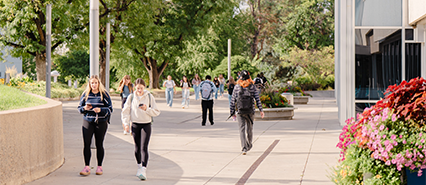Prof Awarded National Science Foundation TRIUMPHS Grant
Release Date: September 02, 2015
Press Release
PUEBLO - Colorado State University-Pueblo Mathematics Professor Janet Barnett has received funding through a major grant from the National Science Foundation as part of a national, seven-university collaboration to develop, test, and publish innovative new materials for teaching undergraduate mathematics.
The Transforming Instruction in Undergraduate Mathematics via Primary Historical Sources (TRIUMPHS) program will replace standard classroom lectures with a collection of “primary source projects” (PSP) that directly engage students with the mathematics they are studying. Each PSP will focus on a particular mathematical concept or procedure as it was developed by a historic mathematician. Students read source documents by the original author, and through a series of exercises that are woven throughout the project, develop a fuller understanding of the mathematics they are studying as they react to the historical source, organize their thoughts about the mathematical ideas in the source, and rediscover groundbreaking ideas for themselves.
Barnett’s collaborators in TRIUMPHS include faculty from the University of Colorado - Denver, New Mexico State University, Central Washington University, Florida State University, Ursinus College in Pennsylvania, and Xavier University in Ohio. The team received a total of $1.25 million, most of which will be used for the project’s research component and to train faculty in the method. CSU-Pueblo’s share of the five-year award is $100,000.
According to Barnett, teaching with original source material is not really a new idea.
“The humanities and social sciences do this all the time. For example, students learn philosophy by actually reading great philosophical minds like Plato and Descartes. But in mathematics, we don’t have students read Newton or Gauss.,” she said. “Instead, we give them modern equations and theorems without any motivation as to how or why they were developed. Students miss out on a big part of the picture that they need to deeply understand the mathematics that they are learning.”
Barnett’s belief in the benefits of this teaching method is based on her experience using PSPs with her students over the last decade. She has written seven PSPs with prior support from the NSF, delivered presentations about the method at regional, national, and international conferences, and published several journal articles about it.
“The difference in how well students come to understand the mathematics when it’s placed in its historical context is simply astounding,” Barnett said. She said most math textbooks simply present mathematical ideas in a distilled form that is removed from the questions that motivated their initial development. In contrast, original sources place these ideas in the context of the problem the author wished to solve, and the setting in which the work was done. PSP exercises also enhance students’ verbal and deductive skills, while helping them to develop important mathematical habits of mind such as solving problems, making conjecture, and creating definitions.
The TRIUMPHS team will create and test at least 50 new PSPs of different lengths, on topics ranging from trigonometry and pre-calculus to advanced calculus and abstract algebra. Barnett and her collaborators also will provide training in the use of PSPs to more than 100 faculty members and doctoral students all across the country. More than 50 faculty members from 31 geographically and institutionally diverse institutions already have committed to using PSPs in their classes, including five faculty members at CSU-Pueblo.
TRIUMPHS also will complete an evaluation-with-research study in order to provide the team with feedback throughout the award period, while simultaneously contributing to the research base in STEM (Science, Technology, Engineering and Mathematics) education.
“The research component of the grant is especially exciting, since it will allow us to study the impact of this approach on student learning with more than just anecdotal evidence,” Barnett said.
Colorado State University - Pueblo is a regional, comprehensive university emphasizing professional, career-oriented, and applied programs. Displaying excellence in teaching, celebrating diversity, and engaging in service and outreach, CSU-Pueblo is distinguished by access, opportunity, and the overall quality of services provided to its students.


